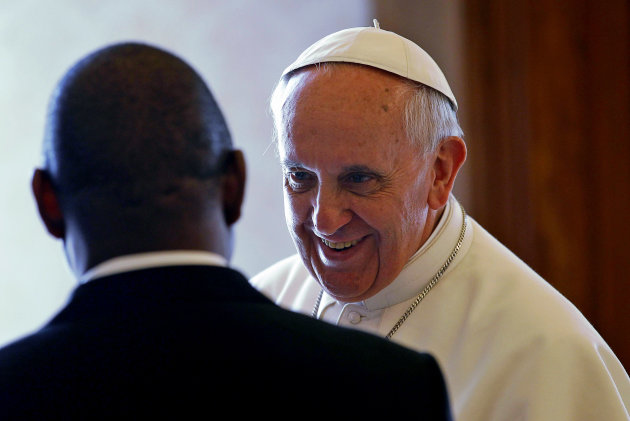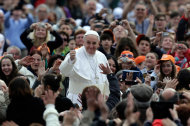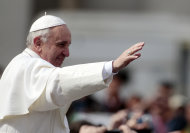Image may be NSFW.
Clik here to view.
Clik here to view.

By | Associated Press
VATICAN CITY (AP) — Pope Francis has spent much of his first month as pope charming ordinary Catholics with his ordinary yet extraordinary papal ways and making clear he is very much the boss when it comes to decisions as small as the shoes he wears to where he rests his head at night.
In the coming months, he'll face decisions of far greater import as he responds to demands from cardinals in far-flung dioceses and Vatican officials at home for an overhaul of the Holy See bureaucracy, the dysfunctional family business he inherited one month ago Saturday.
Given Francis' governing style and track record, it's likely he'll make these choices with an eye to efficiency, and very much alone.
Prelates are demanding term limits on Vatican jobs to prevent priests from becoming career bureaucrats. They want consolidated financial reports to remove the cloak of secrecy from the Vatican's murky finances. And they want regular Cabinet meetings where department heads actually talk to one another to make the Vatican a help to the church's evangelizing mission, not a hindrance.
"It just doesn't work either very quickly or very efficiently," U.S. Cardinal Francis George, the archbishop of Chicago, said. "Take marriage cases: People shouldn't have to be asked to wait three, four, five, six years to get a response" for a request for an annulment.
Francis is meeting daily with department heads and on Friday made an impromptu visit to the secretariat of state, getting a handle on a government that was last reformed by Pope Paul VI a half-century ago and was shown by the leaks of papal documents last year to be infected by power struggles, incompetence and sheer ungovernability.
He has made one Vatican appointment so far, naming a member of his namesake Franciscan order to the important No. 2 spot at the Vatican's congregation for religious orders. His most eagerly-watched appointment has yet to come: that of the Vatican secretary of state, who runs the day-to-day administration of the Holy See. Currently, the position is held by Cardinal Tarcisio Bertone, a 78-year-old canon lawyer whose administrative shortcomings have been blamed for many of the Vatican's current problems today.
George Weigel, a papal biographer who interviewed then-Cardinal Jorge Mario Bergoglio last May for his new book "Evangelical Catholicism," said Francis understands well the problems of the Curia, or Vatican bureaucracy. He said Bergoglio "displayed a shrewd, but not cynical, grasp of just what was wrong with the church's central bureaucratic machinery, and why."
"I think we can expect the new pope to lead the church in a purification and renewal of the episcopate, the priesthood, the religious life, and the curia, because he understands that scandal, corruption, and incompetence are impediments" to the mission of spreading the faith, Weigel wrote in a recent essay.
Francis' austere style and track record governing the Jesuit order in his native Argentina and then the archdiocese of Buenos Aires has given reformers hope: Several cardinals have cited Francis' record as evidence that he has what it takes to make tough, unpopular decisions when necessary.
Bergoglio was named provincial of the Jesuits in Argentina in 1973 at the very young age of 36, and by all indications clashed with more left-leaning members of the order who were increasingly taking up the call of liberation theology, the belief that Christ's teachings justify fights against social injustices. His six-year term also spanned the initial years of the 1976-1983 military junta, which kidnapped and killed thousands of people in a "dirty war" to eliminate leftist opponents. Two of Bergoglio's own priests were kidnapped, but later freed after his intervention.
"He knows how to govern," George said. "He's done all those in very difficult circumstances."
In the 2010 book "The Jesuit," written by his authorized biographer, Bergoglio explained his decision-making process, saying he always discounts his first ideas because they're "always wrong."
"One can ask for advice but, in the end, one must decide alone," he said. Doing so means making mistakes, and Bergoglio acknowledged he had made plenty in his lifetime.
"That's why the important thing is to ask God," he said.
Cardinal Timothy Dolan of New York, who has become something of the ringleader of the reform group, said he had high hopes that Francis would turn the Holy See into a model of good governance given his background and no nonsense style.
"Sometimes in the past the curia has been an example of what not to do, instead of what to do," Dolan said in an interview. "We need to look to the Holy See and the Roman Curia as a model of good governance, of honesty, of simplicity, of frugality, of transparency, of candor, of raw Gospel service, of a lack of careerism, of people who are driven by virtue."
Dolan suggested that one crucial area of reform would be imposing term limits on Vatican bureaucrats to prevent them from becoming lifers. Such a move would both reduce the "careerism" that afflicts many a Vatican bureaucrat while also encouraging bishops around the world to lend Rome their best men knowing that they would be gone for only a few years, not life.
"You need a change in philosophy, in the guiding spirit," Dolan said.
Dolan said there was also no reason why more laymen and women couldn't be brought into the Vatican bureaucracy, particularly in the Vatican's offices for families or laity. And there's no reason not to trim back a government that has "mushroomed" over the years, he said. Already, Italian news reports have said Francis is mulling a reorganization and streamlining of the Vatican secretary of state.
Archbishop Claudio Mario Celli, who heads the Vatican's social communications office, wants greater communication within the various Vatican departments, including regularly scheduled meetings of department heads.
"We need a more synergetic activity," Celli said in an interview. "If we want to have a more effective service in the church, we need to have a symphonic approach."
George, the archbishop of Chicago, is seeking greater financial transparency. He is on the board of 15 cardinals who meet regularly to go over the Vatican's budget.
"The little bit I know comes from finding out what goes on during those meetings," George said. He called for greater financial transparency within the Vatican itself, including instituting consolidated financial reporting.
"How do you run an efficient government if the right hand doesn't know what the left hand is doing?" George said.
George dismissed speculation in the Italian media that the Vatican bank, the Institute for Works of Religion, might be closed as part of Francis' reform, as it's long been a source of scandal.
Doing so would be financial suicide for the Vatican, since it currently provides the pope with about 50 million euros ($65 million) a year in investment income using, among other things, assets of its account holders.
The Vatican spokesman, the Rev. Federico Lombardi, said any speculation about the IOR's possible closure "is purely hypothetical and isn't based on any believable or concrete facts."

